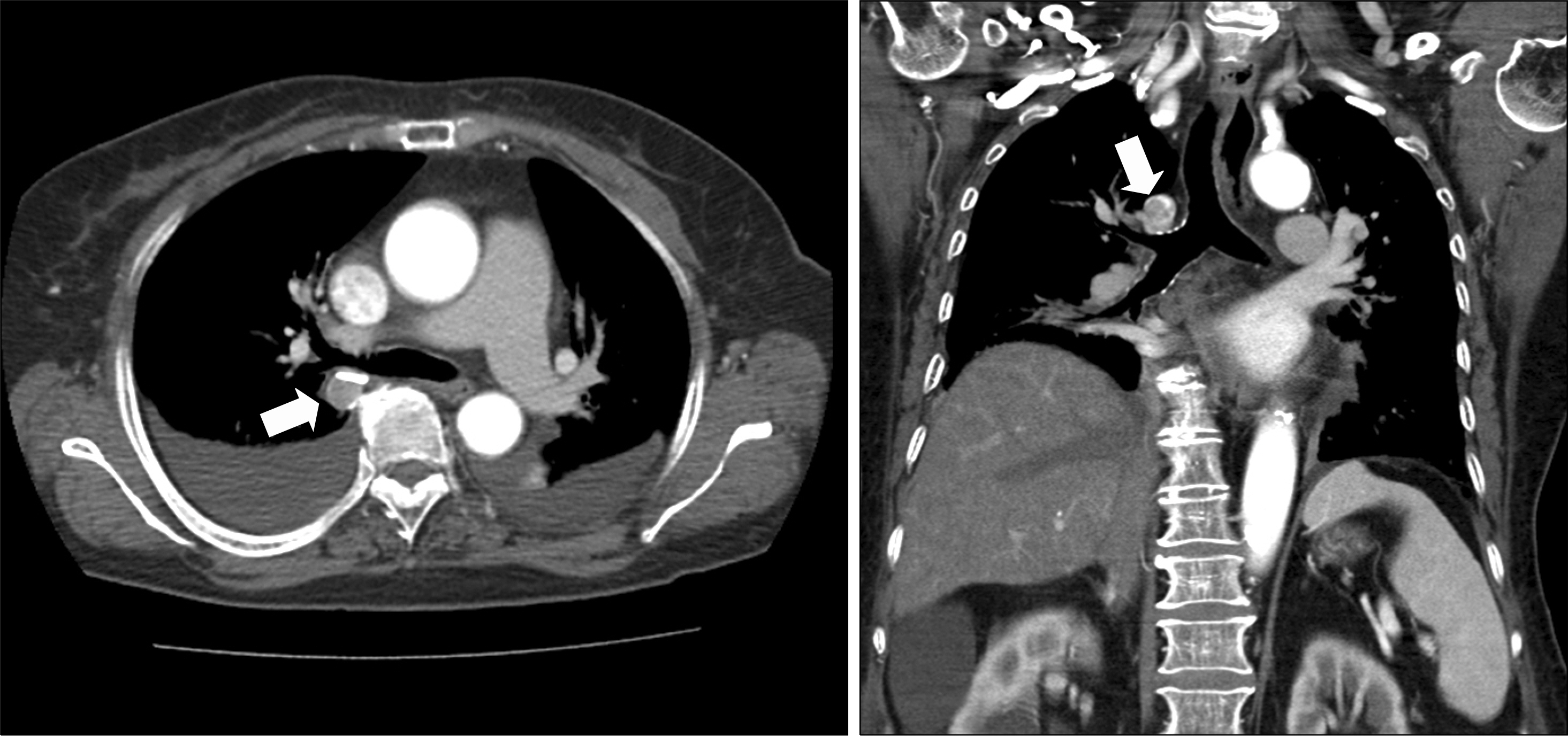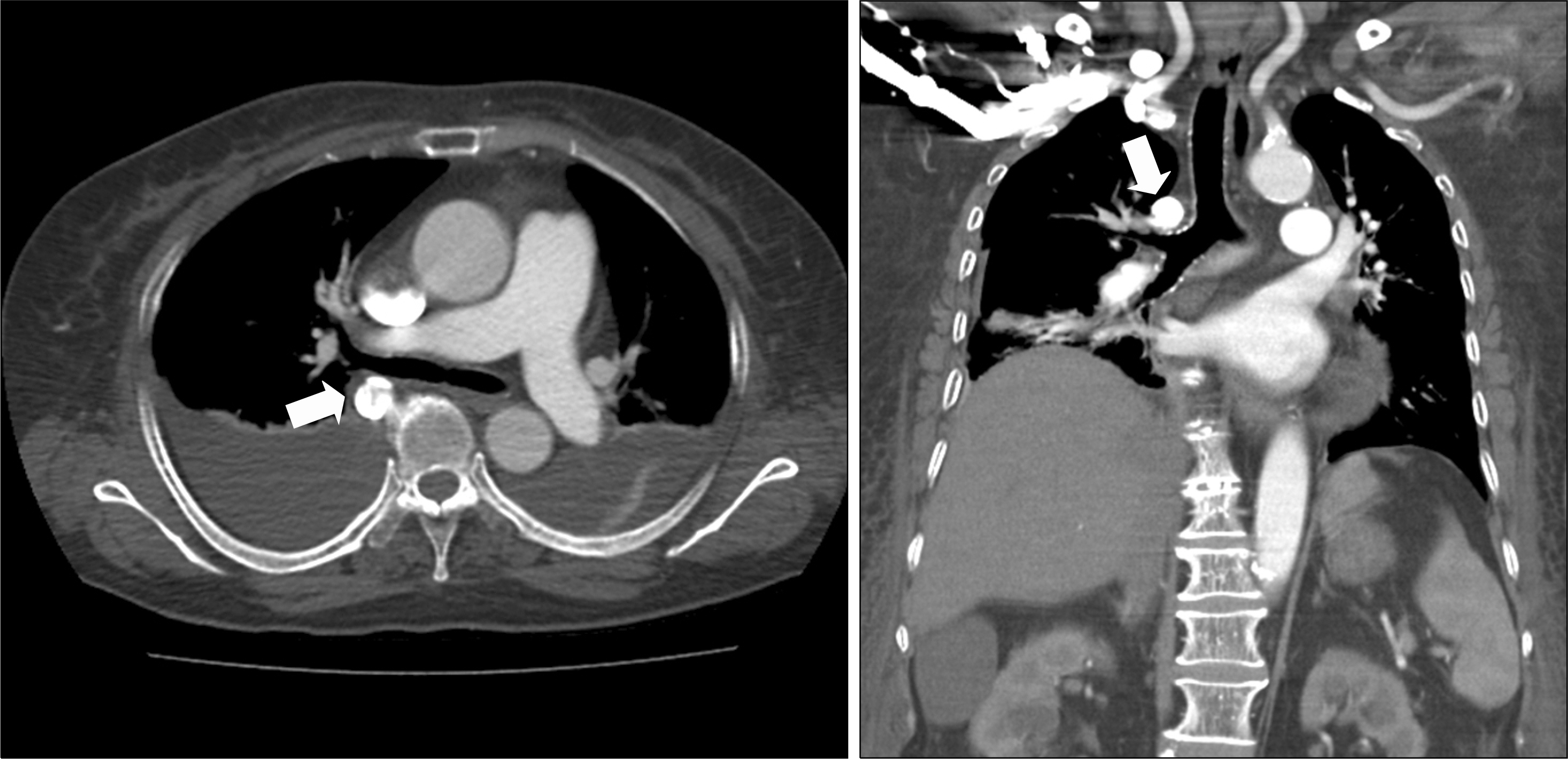J Rheum Dis.
2016 Apr;23(2):118-121. 10.4078/jrd.2016.23.2.118.
A Case of Azygos Vein Thombosis Associated with Transient Antiphospholipid Syndrome in Urinary Tract Infection with Escherichia coli
- Affiliations
-
- 1Division of Nephrology, Department of Internal Medicine, Seoul Red Cross Hospital, Seoul, Korea. moeru1@naver.com
- 2Department of Nephrology, Kyung Hee University School of Medicine, Seoul, Korea.
- KMID: 2222788
- DOI: http://doi.org/10.4078/jrd.2016.23.2.118
Abstract
- A 73-year-old female with diabetes admitted for treatment of an intertrochanter fracture of the femur and a urinary tract infection (UTI) with Escherichia coli developed thrombosis in her right azygos vein, which was thought to be associated with antiphospholipid and immunoglobulin M anticardiolipin antibodies. After antibiotic therapy, antiphospholipid antibody was undetectable, and a repeat chest computed tomography showed complete resolution of the azygos vein thrombosis. A wide variety of infections can be associated with thrombotic events in patients with transient antiphospholipid syndrome (APS), and this case serves as a reminder that the possibility of transient APS should be considered in patients with venous thrombosis in the setting of a UTI.
MeSH Terms
-
Aged
Antibodies, Anticardiolipin
Antibodies, Antiphospholipid
Antiphospholipid Syndrome*
Azygos Vein*
Escherichia coli*
Escherichia*
Female
Femur
Humans
Immunoglobulin M
Thorax
Thrombosis
Urinary Tract Infections*
Urinary Tract*
Venous Thrombosis
Antibodies, Anticardiolipin
Antibodies, Antiphospholipid
Immunoglobulin M
Figure
Reference
-
1. Cervera R, Piette JC, Font J, Khamashta MA, Shoenfeld Y, Camps MT, et al. Antiphospholipid syndrome: clinical and immunologic manifestations and patterns of disease expression in a cohort of 1,000 patients. Arthritis Rheum. 2002; 46:1019–27.
Article2. Cervera R, Asherson RA, Acevedo ML, Gómez-Puerta JA, Espinosa G, De La Red G, et al. Antiphospholipid syndrome associated with infections: clinical and microbiological characteristics of 100 patients. Ann Rheum Dis. 2004; 63:1312–7.
Article3. Wells PS, Anderson DR, Rodger M, Stiell I, Dreyer JF, Barnes D, et al. Excluding pulmonary embolism at the bed-side without diagnostic imaging: management of patients with suspected pulmonary embolism presenting to the emergency department by using a simple clinical model and d-dimer. Ann Intern Med. 2001; 135:98–107.
Article4. Miyakis S, Lockshin MD, Atsumi T, Branch DW, Brey RL, Cervera R, et al. International consensus statement on an update of the classification criteria for definite antiphospholipid syndrome (APS). J Thromb Haemost. 2006; 4:295–306.
Article5. Levine JS, Branch DW, Rauch J. The antiphospholipid syndrome. N Engl J Med. 2002; 346:752–63.
Article6. Misita CP, Moll S. Antiphospholipid antibodies. Circulation. 2005; 112:e39–44.
Article7. Dalekos GN, Zachou K, Liaskos C. The antiphospholipid syndrome and infection. Curr Rheumatol Rep. 2001; 3:277–85.
Article8. Asherson RA, Cervera R. Antiphospholipid antibodies and infections. Ann Rheum Dis. 2003; 62:388–93.
Article9. Ioannou Y, Giles I, Lambrianides A, Richardson C, Pearl LH, Latchman DS, et al. A novel expression system of domain I of human beta2 glycoprotein I in Escherichia coli. BMC Biotechnol. 2006; 6:8.
Article10. Cicconi V, Carloni E, Franceschi F, Nocente R, Silveri NG, Manna R, et al. Disappearance of antiphospholipid antibodies syndrome after Helicobacter pylori eradication. Am J Med. 2001; 111:163–4.
Article11. Blank M, George J, Fishman P, Levy Y, Toder V, Savion S, et al. Ciprofloxacin immunomodulation of experimental anti-phospholipid syndrome associated with elevation of interleukin-3 and granulocyte-macrophage colony-stimulating factor expression. Arthritis Rheum. 1998; 41:224–32.
Article12. Kang WS, Min JW, Park SJ, Lee MK, Park CS, Chung JH. A case of septic azygos vein embolism caused by staphylococcus aureus bacteremia. Tuberc Respir Dis (Seoul). 2012; 72:328–31.13. Okur A, Intepe YS, Serin HI, Yı ldı rım U, Mavili E. Recurrent pulmonary embolism in an asthmatic patient who had inter-rupted inferior vena cava with azygous continuation. Turk Kardiyol Dern Ars. 2014; 42:277–80.
Article14. Hellfritzsch MB. General anatomy and musculoskeletal system. Acta Radiol. 2015; 56:NP24.
Article15. Vallianou N, Lazarou V, Tzangarakis J, Barounis R, Sioula E. Pulmonary embolism as the first manifestation of multiple myeloma. Case Rep Med. 2013; 2013; 236913.
Article
- Full Text Links
- Actions
-
Cited
- CITED
-
- Close
- Share
- Similar articles
-
- Urinary Tract Infection Caused by Escherichia coli
- O serotypes of escherichia coli isolated from patients with urinary tract infections
- Unexpected Septic Shock after Ureteroscopic Lithotripsy in a Patient Preoperatively Treated for a Urinary Tract Infection
- Clinical significance of E. coli O26 isolates on urine specimen of urinary tract infection
- Symmetrical Peripheral Gangrene Complicating Escherichia coli Sepsis Associated with Antiphospholipid Antibodies in Lupus Nephritis



